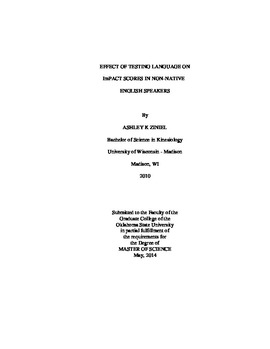| dc.contributor.advisor | Volberding, Jennifer | |
| dc.contributor.author | Ziniel, Ashley K. | |
| dc.date.accessioned | 2015-06-17T20:08:51Z | |
| dc.date.available | 2015-06-17T20:08:51Z | |
| dc.date.issued | 2014-05-01 | |
| dc.identifier.uri | https://hdl.handle.net/11244/15218 | |
| dc.description.abstract | As the number of foreign-born student-athletes in NCAA sports continues to grow, finding accurate ways to evaluate concussions in spite of language and cultural differences is imperative to providing quality athletic healthcare. The purpose of this study was to determine if a difference in scores on the web-based ImPACT concussion assessment exists when non-native English speakers take the test in their native language versus in English. The study also sought to determine if the magnitude of the difference is associated with previous exposure to the English language. Thirty healthy subjects (22 female, 8 male, age 24.4 �3.9) completed the ImPACT test twice in a controlled environment, first in their native language and then approximately two weeks later in English. Information regarding the number of years that subjects had lived in a primarily English-speaking country and the number of years of formal English education they had received was also collected to assess previous exposure to the language.A paired samples t-test was conducted on each of the composite scores generated by ImPACT along with the total symptom score and the Cognitive Efficiency Index. The results showed that subjects tested better in their native language on scores for verbal memory, visual motor speed, and Cognitive Efficiency Index (p<.05). Analysis did not find a correlation between the magnitude of the difference for any test scores and either measure of previous English exposure. Anecdotal evidence from the study also reveals that clinicians should be aware of the effect of language on symptom scoring, though a difference based on testing language did not reach statistical significance. Overall, the data suggest that, regardless of a student-athlete's previous experience with the English language, he/she should take the ImPACT test in his/her native language whenever possible to provide the most accurate measure of neurocognitive functioning. Future research should investigate if testing language affects scores on other concussion assessments as well as determining if score differences become more pronounced on a post-concussion test. | |
| dc.format | application/pdf | |
| dc.language | en_US | |
| dc.publisher | Oklahoma State University | |
| dc.rights | Copyright is held by the author who has granted the Oklahoma State University Library the non-exclusive right to share this material in its institutional repository. Contact Digital Library Services at lib-dls@okstate.edu or 405-744-9161 for the permission policy on the use, reproduction or distribution of this material. | |
| dc.title | Effect of Testing Language on Impact Scores in Non-native English Speakers | |
| dc.type | text | |
| dc.contributor.committeeMember | O'Brien, Matthew | |
| dc.contributor.committeeMember | Warren, Aric | |
| osu.filename | Ziniel_okstate_0664M_13304.pdf | |
| osu.accesstype | Open Access | |
| dc.description.department | Education (all programs) | |
| dc.type.genre | Thesis | |
| dc.subject.keywords | concussion | |
| dc.subject.keywords | cultural competency | |
| dc.subject.keywords | impact | |
| dc.subject.keywords | language | |
| dc.subject.keywords | neurocognitive testing | |
| dc.subject.keywords | non-native english speakers | |
